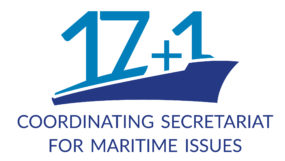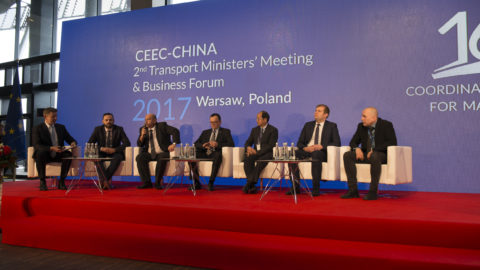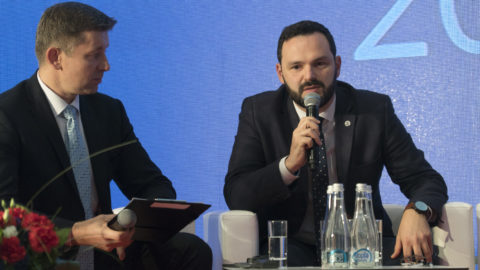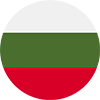Business always follows a pragmatic mindset, which is also a guideline for the actions of United Nations Global Contact. The UN policy is focused on a directional, long-term impact, which sometimes means that we must wait for the response of the private sector, especially when the UN system develops so-called megatrends with other governments. There is also a reverse situation, when the business sector forces the acceleration of the reaction of stakeholders, as some things were invented a long time ago, especially in the field of industrial or economic innovations in particular industries. This also applies to the transport sector, which sector is evolving very dynamically. It is difficult to force anyone to change the means of transport, e.g. to change from a train to a ferry, in case such a change would generate costs; if it does generate costs, it is a bad solution from the business point of view. Then, there is a need to come up with a cheaper and more effective solution. Megatrends are discussed every few months either in New York or in Geneva during the meetings of the Economic Commission for Europe (UNECE), in which partners from such agencies as the United Nations Industrial Development Organization (UNIDO) participate. Discussions concern both industrial innovations in the transport sector and the construction of new global routes, such as the Silk Road, including both land and sea branches. The Three Seas Initiative is one of the most interesting, recently announced political megatrends, perfectly showing the unique geopolitical position of Poland, where Poland has a chance to gain a lot of benefits as a transit country.
The key recommendations articulated by Global Compact are as follows: the adoption of the AGN Convention, the establishment of the Oder and Vistula Commission at UNECE and, within the non-combined administration, the establishment of a separate team dealing with the implementation of tasks resulting from the convention. These recommendations were implemented to the level of 80% in 2016 and 2017. The Stakeholders’ Forum constitutes the next task. We define the forum as a group of practitioners to whom specific activities will be commissioned. It is extremely important that the companies taking part in this venture, from ports to companies that carry out individual investments, as well as logistics companies and logistics centres that are established in the course of these activities, enter into dialogue with each other and develop common business strategies, especially long-term ones. Business strategies are the basis for managerial decisions on the financing of investments, so there is always a specific amount of funding supporting them. Therefore, it is extremely important to organise and coordinate activities in this area. This applies to the agreement being drawn up between the Ministry of Maritime Economy and Inland Navigation and Global Compact. I am glad that the Ministry of Maritime Economy and Inland Navigation understands this issue and is ready to discuss about it. Goods can flow through Poland for the benefit of the country.
Three waterway transport corridors, namely the E30, E40, E70, are the shortest routes connecting the Baltic Sea, the Adriatic Sea and the Black Sea. And here comes the business pragmatism. If it is the shortest, then it is the cheapest. If it is the cheapest, there must be an infrastructure that guarantees the right speed and quality of transport with all holistic solutions. Logistics centres should be located at river ports, the number of which is quite numerous along the Vistula and Oder Rivers. In the past, many of them served as ports for a long time, especially along the Vistula River, e.g. those of Gdańsk, Kraków or Płock. The establishment of logistics centres on the basis of these ports is just a matter of their expansion and adaptation as well as of connecting them with railway lines. If it is possible to estimate the reloading weight of freight that will be sent to Poland within the next few years, then it is almost certain that the interest of the business sector will be attracted. Again, you can refer to megatrends at this point. The knowledge of the size of the reloading weight transported by partners from Southeast Asia, mainly from China, will allow for the preparation of an appropriate receiving infrastructure in Europe, including Poland, which will become a gateway to European cooperation. There is also a huge challenge for the Baltic ports, which are already experiencing their renaissance in terms of the number of goods received. In this situation, the efficiency of inland transport infrastructure, not only of river infrastructure but also of railway and road infrastructure, is extremely important. The freight cannot be blocked in the port. The fast delivery of freight requires fast unloading and fast delivery to the destination. This is a huge challenge that Poland is going to face in the near future. We have to do everything possible to take advantage of the enormous opportunities that the Oder River offers the port of Szczecin, and of the opportunities that the Vistula River offers to the ports of Gdańsk and Gdynia. Likewise, the gas terminal in Świnoujście and its gradual extension are crucial for Poland’s energy security.
The adoption of the AGN agreement by Poland creates great opportunities for the development of inland waterway transport. These are primarily funding opportunities that are discussed within the strategic investment team. Those considerations concern the question of in which mode and how to optimally use the financing, including international financing, so that the supporting infrastructure can be established as soon as possible. This in turn will allow precise statistics and calculations to be carried out, determining the time of the arrival of goods in Polish ports, the time needed for unloading and the choice of means of transport – river barges or alternative means of transport, such as railways or roads. This will be important information for partners from Western Europe and Asia, and they will demonstrate that Poland is a significant and attractive partner on the map of global transport corridors.
The issue of neighbours competition should be considered in terms of cooperation
Our neighbours are very often inconvenienced by the obstruction of waterways in Poland. For instance, the Czech Republic is an inland country that has no sea access, but international law guarantees such access through Polish rivers. Sometimes, in the international debate, it is forgotten that political decisions, such as those taken by Poland to improve inland waterway transport, have consequences for countries that also want to enjoy the benefits of access to the sea. This becomes real only when the transit country allows the use of its own waterway network. It is known that both Poland and the Czech Republic belong to the European community and can synergistically benefit from these gifts. Of course, the list of inland countries that need to use such solutions is much longer.
The inland navigation development programme is extremely important and solves many more problems than the obvious ones.
Mr Kamil Wyszkowski pointed to the issue of flooding. He recalled the 1997 flood, which had catastrophic consequences both for Poland and the Czech Republic. One of the reasons for such large losses was the lack of solutions for large and small water retention, the lack of retention basins (so-called wet retention basins) that could absorb excess water during intense rainfall and return it during drought. In addition, an adequate level of water in the rivers is necessary for the movement of barges (this is particularly true for rivers of navigability classes 4 and 5) and for providing cooling for conventional energy. The water crisis is another issue that has to be discussed. In Poland, there is only 1,600 m3 of water per capita available per year, while the European average is 4,700 m3. In Spain, where the water crisis has long been announced, this value reaches 2,700 m3. These numbers clearly indicate that water must definitely be taken care of in Poland. Therefore, the inland navigation development programme is extremely important and solves many more problems than the obvious ones.
Kamil Wyszkowski, General Director of Global Compact in Poland





 Albania
Albania Bosnia and
Bosnia and Bulgaria
Bulgaria China
China Croatia
Croatia Czechia
Czechia Estonia
Estonia Hungary
Hungary Latvia
Latvia Lithuania
Lithuania
 Montenegro
Montenegro Poland
Poland Romania
Romania Serbia
Serbia Slovakia
Slovakia Slovenia
Slovenia